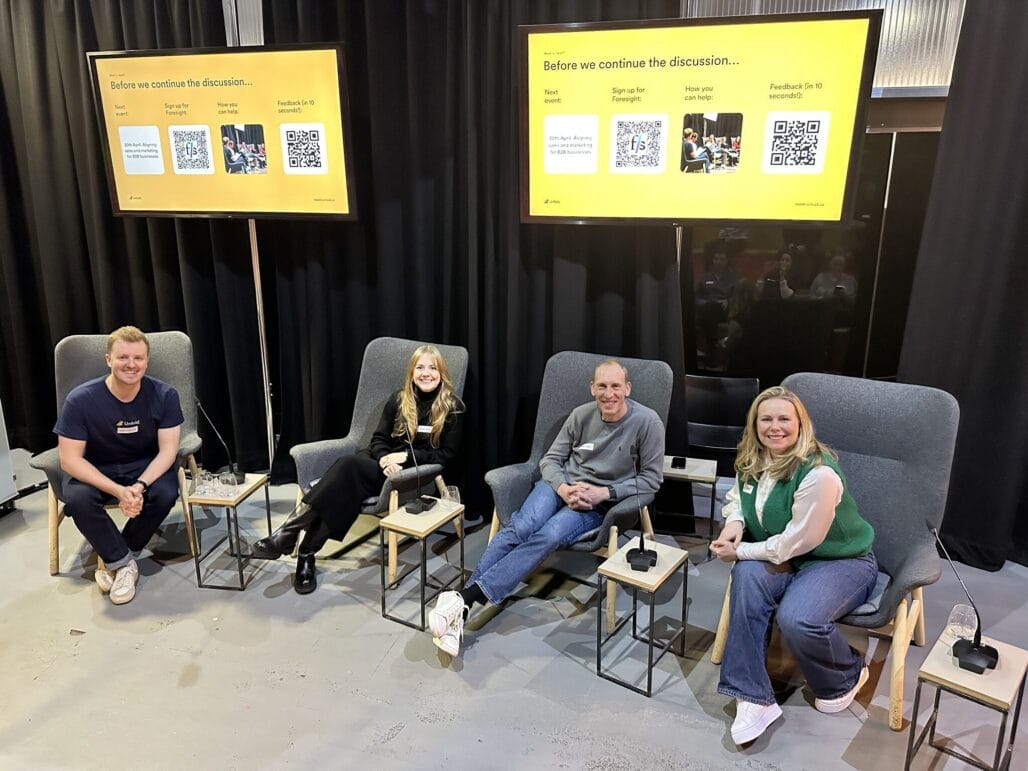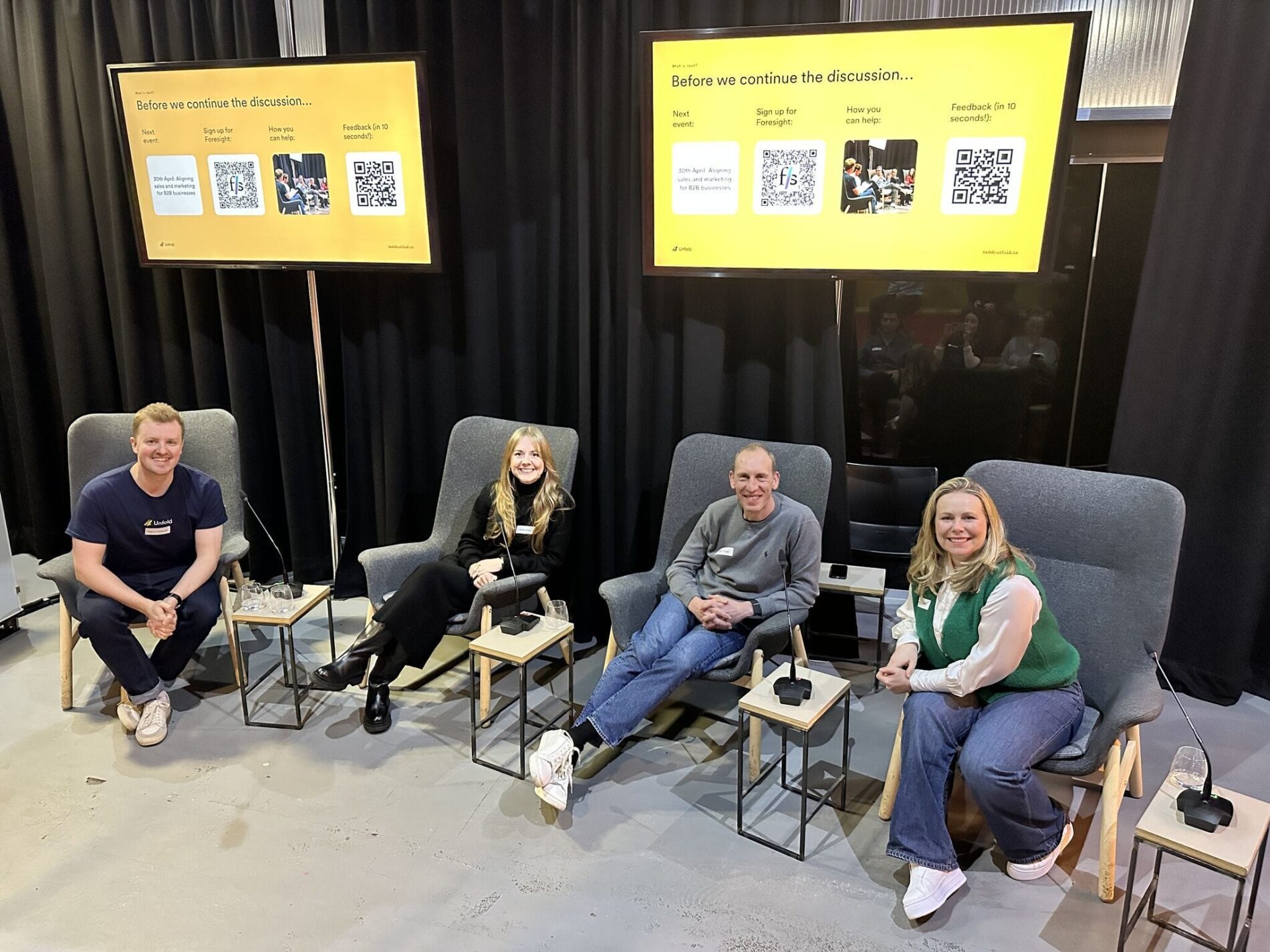We had an amazing evening at our People & culture: Strategies for leading thriving teams with our excellent panel Alan Furley, Alicia Grimes and Jaye Cowle.
Meet our expert panel
Alan Furley, ISL Talent: Alan partners with ambitious founders and scaleup leaders to master the art of building exceptional teams. He provides tailored support to startups, from refining hiring processes to devising effective strategies for talent growth and retention. With deep expertise in aligning culture with hiring practices, Alan ensures that companies not only find the right talent but also retain top performers as they scale. As a mentor and advisor with experience across multiple accelerators and business networks, Alan’s insights are rooted in hands-on experience. He has a track record of guiding both founders and job seekers through the complexities of startup hiring, making him an invaluable resource for anyone looking to navigate the startup landscape.
Alicia Grimes, The Future Kind Collective: Alicia is a leader in crafting impactful, human-centred cultures for startups and growing businesses. With over 15 years of experience in service design and strategy, she focuses on building robust company Operating Systems that foster sustainable growth. Her expertise in culture development has led her to collaborate with renowned organisations like ITV, NHS, and Pizza Hut Digital Ventures, making her a go-to expert in designing scalable, customer-centric cultures. Alicia’s approach is all about integrating design thinking into the core of an organisation, transforming the way businesses operate and engage with their people.
Jaye Cowle, Launch: Jaye is the CEO and Founder of Launch, the happy performance agency, with 35 experts across two offices in Bristol and Exeter. Jaye has created a high performing team at Launch by being a champion for both employee well-being and professional growth – her ethos is happy people do great work. Jaye speaks widely about leadership, team motivation, and building a thriving agency culture powered by happiness. Her infectious positivity and commitment to excellence makes her stand out in the industry and a role model for female entrepreneurs. Under her guidance, Launch has become a trusted partner for brands looking to drive growth through their digital advertising and connect meaningfully with their potential customers.

Image credit: Jaye Cowle
Insights:
- Good culture = transparent culture
- Psychological safety vs accountability is a careful balance
- Autonomy, Mastery & Purpose are needed for a happy team
- “Stay interviews” are key to retention
- Culture isn’t just a set of slogans – it’s lived everyday
- Culture fit, inclusivity & challenging status quo
Good culture = Transparent culture
Investing in company culture doesn’t always require large budgets, but it does demand intentional decisions. In challenging times, placing a focus on people through inclusion, trust, and transparency is essential for long-term success.
Misalignment between the culture you promote and the reality of the workplace will lead to failure. If long hours are part of the job, be upfront about it. This allows individuals to understand what they’re committing to. Don’t say, “Work-life balance is a top priority for us” just because it sounds appealing, and then expect employees to work excessive hours! Being honest about expectations ensures trust and clarity across the board.
During economic downturns, it’s easy for culture to take a back seat, but maintaining a transparent culture is more crucial than ever. In times of uncertainty, businesses that prioritise transparency create an open, honest environment where all employees feel informed and valued. Transparent communication fosters trust, encourages collaboration, and enables quicker adaptation to challenges. By continuing to support smaller businesses that champion inclusive, transparent cultures, we empower organisations to navigate adversity with greater resilience, building a stronger foundation for long-term success.
Empathy must be balanced with accountability however, to avoid “ruinous empathy” (where a fear of hurting someone’s feelings inhibits the ability to give honest feedback).
Be transparent about expectations when personal issues arise during working hours. Providing support for major life events (bereavement, jury duty, etc.) and having clear policies around these situations helps employees feel valued and cared for.
Psychological safety vs accountability is a careful balance
The best teams achieve the balance between psychological safety (where people feel safe to speak up) and accountability (where ownership of outcomes is encouraged). A culture that supports both creates an environment where feedback and performance thrive.
Alicia discussed Amy Edmondson’s concept of psychological safety, explaining that while it’s crucial that people feel safe in order to do their best work, fail, speak up, and share ideas, it must be balanced with accountability.
Too much psychological safety can lead to complacency, where people become too relaxed and let things slide. And holding people accountable for key targets without sufficient support can lead to a stressed and burnt-out workforce. The key is to strike the right balance—creating a space where people can perform at their best while also having mechanisms in place for peers to give honest feedback and hold each other accountable, ensuring continuous improvement.
Alan explained the importance of regularly reviewing and adjusting accountability models like RACI (Responsible, Accountable, Consulted, Informed) to ensure that everyone understands their roles and responsibilities. He also made the point that if leaders try to keep oversight of all key decisions and don’t properly delegate accountability to their managers, this can undermine the managers’ authority and leave them feeling demotivated.
Autonomy, Mastery & Purpose are needed for a happy team
Jaye discussed Dan Pink’s book ‘Drive’, highlighting that autonomy, mastery, and purpose are key motivators for long-term engagement. People perform best when they have control over their work, opportunities for growth, and a meaningful connection to the organisation’s goals.
Jaye explained that autonomy means giving people the power to affect change and control their work; mastery involves providing the tools, knowledge, and opportunities for skill development; and purpose means helping people understand why their work matters. When employees understand the purpose behind their tasks, they may even find better ways to achieve the goal than originally intended.
She emphasised that motivation isn’t just about extrinsic rewards like perks or bonuses, but about understanding the deeper, intrinsic factors that drive performance. As she explained, “It’s not about throwing in bean bags and pizza and assuming that will solve everything. People don’t intentionally do a bad job; usually, they either don’t understand what’s expected of them or don’t have the right tools to succeed.”
While benefits like salary and perks are important, getting the intrinsic motivations right is what truly drives engagement and performance.
“Stay interviews” are key to retention
Don’t wait until someone resigns to understand why—the key to proactive feedback is conducting “stay interviews” every six months. Alicia explained that “stay interviews” offer valuable insights into what’s working and where improvements can be made.
By intentionally asking employees questions like, “What’s working for you?” and “How are we living up to our values?” organisations can create space for open dialogue. This allows leaders to spot early signals of potential issues before they escalate, especially in fast-growing companies where leaders may be detached from the daily realities.
Regular stay interviews, ideally every six months, are crucial for gathering timely feedback. Bringing in an independent third party can also help ensure that employees feel heard and provide unfiltered insights.
Culture isn’t just a set of slogans – it’s lived everyday
Culture isn’t just a set of slogans—it’s something that’s lived and breathed every day.
All three panelists agreed that culture is a living and evolving thing that requires constant attention. Regular conversations, clear documentation of values, and setting expectations are key to maintaining and nurturing culture.
Alicia highlighted that in hybrid work environments, having well-documented values and guidelines is particularly essential to ensure everyone is aligned, no matter where they work.
Alan pointed out that founders shouldn’t bear the sole responsibility for shaping culture. Instead, they should make strategic hires who will contribute to and influence the culture. Culture should be an ongoing conversation, one that embraces change and adapts over time.
Ultimately, a strong culture is built on clear, documented values and behaviors that everyone in the company upholds. It’s not about slogans on the wall or annual value statements—it’s about the day-to-day actions and decisions of every team member.
Jaye also emphasised that building a strong culture isn’t about striving for perfection, but about how you respond when things go wrong. In particular, she highlighted the importance of addressing “bad day” behaviors directly (behaviours that aren’t aligned with your culture) and empowering teams to learn and grow from them. She said it was particularly valuable when leaders call out their own “bad day” behaviours as it reminds the team that leaders are just human too and make mistakes!
Culture fit, inclusivity & challenging status quo
Alan discussed Matthew Syed’s book where he talks about creating a diverse workforce. He explained that “you don’t all need to be thinking the same, but you do need to be aligned”.
He went on to explain that when he’s helping clients with hiring, he often challenges the assumption that candidates need to come from a specific background or job route. Instead, asking, “What does success look like 18 months from now?” By focusing on the skills needed—like problem-solving and independent thinking—you realise that the ideal candidate could be anyone: a graduate, someone from hospitality, or even the army.
This approach helps avoid thinking one-dimensionally and encourages a more diverse range of experiences.
“I’ve definitely fallen into the trap of hiring people like myself, just because they seemed like a natural fit.” – Alan Furley
Alicia talked about using a ‘culture add’ approach. Instead of just hiring people that seem like a perfect cultural fit, this approach ensures that new hires add something new to the team – be that new ideas, fresh energy or a different perspective.
A diverse workforce brings a range of perspectives, which is key to innovation. Balancing culture fit with diversity and a willingness to challenge the status quo creates a healthy, evolving culture.
Jaye explained how one of the biggest challenges that many businesses still struggle with is ensuring their hiring process is truly diverse and unbiased. Some strategies she mentioned to help with this included:
- Using redacted CVs,
- Making hiring panels diverse – both in terms of backgrounds and seniority levels,
- Ensuring the interview process is accessible to a wide range of candidates, and
- Regularly challenging the approach to recognise unconscious biases.
She said that these biases won’t disappear overnight, but raising awareness is key. She also emphasised that the responsibility for interrogating the hiring process shouldn’t fall solely to HR—senior leadership must be actively involved in challenging and refining it too.
Culture isn’t just an HR responsibility either; it’s a collective effort from the entire leadership team and the whole company. There’s still a long way to go in truly embedding diversity and inclusion into company cultures, but progress is being made.
To ensure inclusion, it’s important to have data-driven conversations and regularly analyse employee surveys for any equity gaps. Open dialogue about inclusivity builds a stronger, more engaged team.
Some actionable insights anyone can implement
- Use ‘stay interviews’ to gather regular feedback.
- Make every effort to ensure hiring processes are diverse and unbiased.
- Document culture and values clearly for everyone in the organization.
- Build in policies to support employees during life events.
- Regularly review accountability structures (like RACI).
- Use employee surveys to identify inclusion gaps and create a more inclusive environment.
Culture is an ongoing, dynamic process that requires conscious effort from leadership and employees alike. It should be documented, continuously evaluated, and always evolving to meet the needs of the organisation and its people. In times of uncertainty, a clear and supportive culture is what keeps teams strong, connected, and focused on the mission.
A huge thank you to Agilebase, BI Foresight and Rin Hamburgh @ Co for sponsoring this event.
We’d love to see you at our next Smart Cookies event, find out more here
